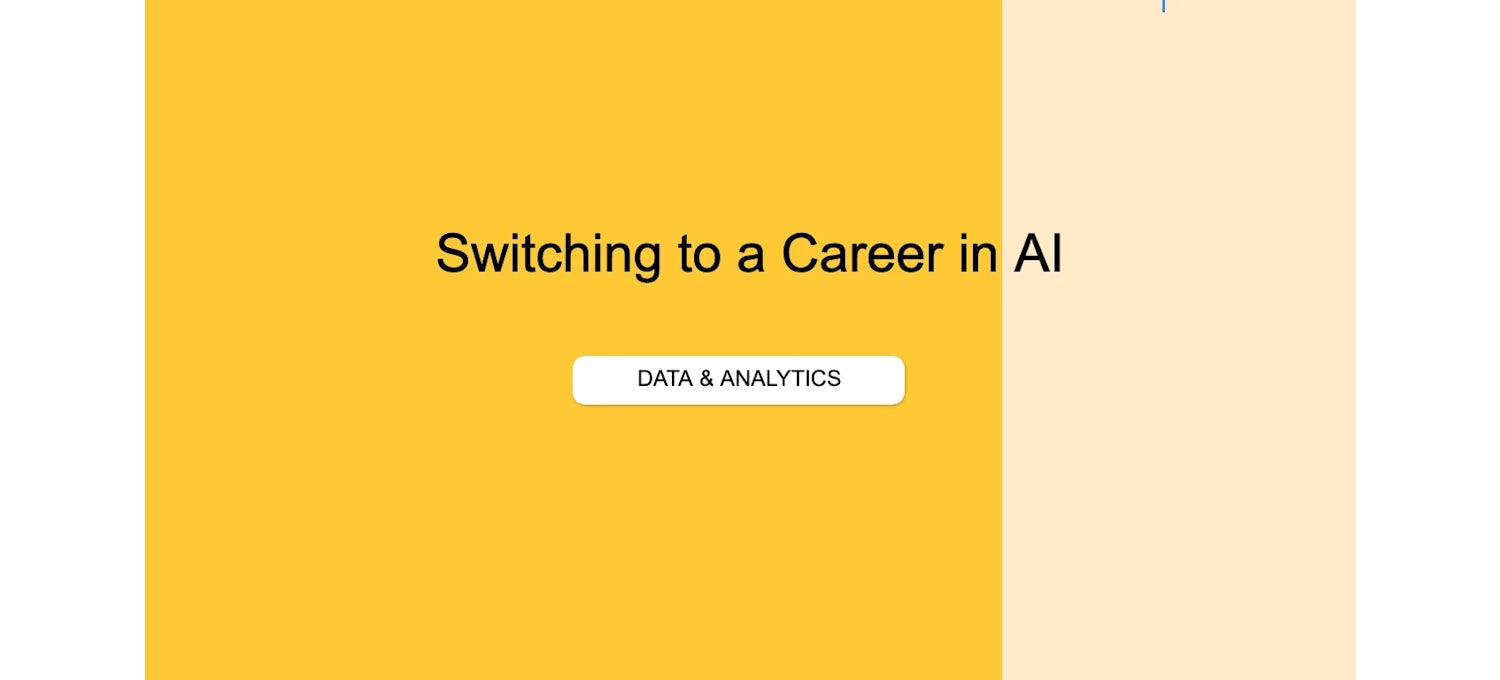How to Successfully Switch to a Career in Artificial Intelligence
Unlock your potential in Artificial Intelligence (AI) by understanding how your current skills can be applied in this transformative field. Explore how various roles incorporate AI elements and discover practical steps to transition your career smoothly.

Artificial Intelligence (AI) is a transformative field at the forefront of technological advancement and innovation, spanning various industries, from health care diagnostics to autonomous vehicles and business analytics. If you are captivated by machine learning, neural networks, or general AI applications and are contemplating a career switch, there are some important factors to consider. This guide will equip you with the essential skills you'll need, advantageous career backgrounds, and practical steps to enter the burgeoning field of AI.
Why Make a Career Change to AI?
AI offers the unique opportunity to work on cutting-edge technologies that have the potential to reshape how we live and work. Careers in AI are often lucrative and provide a high degree of intellectual stimulation and creativity. The field's rapid growth across industries promises a variety of roles, from research and development to applied AI in tech and beyond, indicating dynamic career opportunities.
Read more: What Is an AI Engineer?
Essential Skills for a Successful AI Transition

Click to zoom
Programming Skills: Proficiency in languages like Python, R, or Java is crucial.
Statistical Knowledge and Mathematics: Strong foundation in statistics, probability, and linear algebra.
Machine Learning: Understanding various machine learning models and algorithms.
Data Engineering Skills: Ability to handle and preprocess large datasets.
Problem Solving and Analytical Thinking: Skills to develop new AI algorithms and systems.
Communication Skills: Ability to explain complex AI concepts to non-experts.
Research Ability: Aptitude for continual learning and staying updated with the latest AI advancements.
AI Career Paths: Matching Skills to Roles
| AI Skill | Relevant Careers |
|---|---|
| Programming Skills | Software Engineers |
| Statistical Knowledge and Mathematics | Data Analysts, Statisticians |
| Machine Learning | Data Scientists, AI Researchers |
| Data Engineering Skills | Data Engineers |
| Problem Solving and Analytical Thinking | Systems Analysts, Software Developers |
| Communication Skills | Technical Writers, AI Product Managers |
| Research Ability | Neuroscience Researchers, AI Research Scientists |
Best Gen AI Aligned Careers for a Successful Transition
Software Engineering: Solid grasp of coding and system design essential for developing AI applications.
Data Analyst/Statistician: Ability to interpret and manipulate data critical in training AI models.
Neuroscience/Psychology: Understanding cognitive processes can aid in developing AI that mimics human intelligence.
Physics/Engineering: Complex quantitative skills and modeling experience applicable to AI algorithm development.
Philosophy: Logical thinking and ethical reasoning contribute to AI ethics and societal implications.
Step-by-Step Guide to Changing Your Career to AI
Educate Yourself: Enroll in specialized AI courses and machine learning courses.
Gain Hands-On Experience: Work on projects that allow you to apply AI in real-world scenarios, such as natural language processing or image recognition tasks.
Join AI Communities: Engage with other AI enthusiasts and professionals through forums, meetups, and conferences to learn about industry trends and opportunities.
Build a Portfolio: Showcase your AI projects and contributions on platforms like GitHub to demonstrate your skills and knowledge to potential employers.
Pursue Further Education: Consider advanced degrees or certifications in AI-related fields that can provide a deeper understanding and technical expertise. Read more: Popular Machine Learning Certifications
Apply for AI Roles: Start with roles that match your current level of knowledge in related fields, such as data science or software development, and gradually transition into more specialized AI positions.
Stay Updated: AI is a rapidly evolving field. Keeping up with the latest research, tools, and technologies is crucial for success.
Transitioning to a career in AI is a challenging yet rewarding journey. It requires a solid foundation in technical skills, a commitment to continuous learning, and a passion for innovation. You can pivot successfully into this exciting and impactful field with the right approach and resources.
FAQs about AI Careers
Starting your journey in AI can be both exciting and rewarding. With introductory courses designed for beginners, you can build a strong foundation with Coursera. These courses typically cover the basics of AI, including programming, algorithms, and data analysis. You'll be guided step-by-step, enabling you to gain the necessary skills and confidence to advance further.
AI is an evolving field that welcomes learners of all ages. Whether you're changing careers or enhancing your current skill set, there are resources tailored to your needs. Lifelong learning is a key aspect of growth in the AI industry, and your unique experiences can bring valuable perspectives to the field.
Embarking on a career in AI involves a combination of education and practical experience. Start by exploring foundational courses in AI and machine learning, and then advance to more specialized topics. Engaging in projects, joining AI communities, and pursuing certifications can also help you gain practical experience and make professional connections, setting you on a path toward a successful career in AI.
Coursera
Writer
Coursera is the global online learning platform that offers anyone, anywhere access to online course...
This content has been made available for informational purposes only. Learners are advised to conduct additional research to ensure that courses and other credentials pursued meet their personal, professional, and financial goals.
